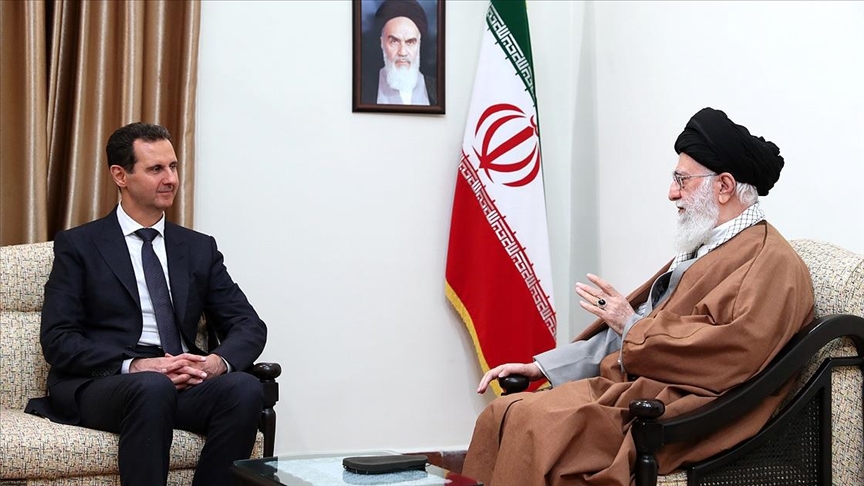In the first step, what shows the importance of Bashar al-Assad’s visit to Iran was the level and quality of Assad’s meetings with high-ranking Iranian officials. The meeting with the Supreme Leader, which took place in an intimate atmosphere, was the most important program of Bashar al-Assad’s visit to Iran. This meeting is in fact a manifestation of the “strategic relations” between the two countries, as well as the prominent position of Syria with the Supreme Leader of the Islamic Revolution.
In this meeting, the Supreme Leader praised the Syrian president, and introduced the high morale of Bashar al-Assad as one of the factors of the country’s resistance and victory in the ten-year international war.
A noteworthy point was the presence of the commander of the Quds Force in Bashar al-Assad’s meeting with the Supreme Leader, which, given the presence of Iranian advisors alongside the government and people in the Syria crisis during the past years, shows that in the post-crisis period, Syria is free from terrorism. Islamic Republic of Iran will continue its presence in Syria until the complete resolution of the crisis in Syria, which is located near the borders of the Zionist regime. At present, the Zionist regime’s movements are the biggest threat against Syria, the elimination of which depends on the increase of the necessary coordination between Tehran and Damascus in the field of security and advisory issues.
Bashar al-Assad’s visit to the Islamic Republic of Iran and his previous visit to some countries in the region and the Arab world, including the UAE, as well as meeting with foreign officials in Damascus, show that the country has been able to overcome many years of efforts in the region and internationally. The goal is to isolate Syria and make the process of regaining its position in the region and the Arab world well.
Objectives of the visit
Bashar al-Assad’s visit to Iran was mainly for political, security and economic purposes, in order to strengthen and strengthen past relations; This is in the context of the Ukraine war and the recent developments in the occupied territories, which have led to changes in the balance of power at the regional and international levels. Bashar al-Assad seems to be seeking to strengthen Iran’s presence in the country by understanding the new international situation and Russia’s involvement in the Ukraine war, which has somewhat reduced Moscow’s focus in other areas, including Syria.
One: Regarding the non-political goals of Bashar al-Assad’s visit to Iran, it is necessary to pay attention to the fact that in the past year, the relations between the two countries have gradually moved away from the security and military environment which is necessary for the war and crisis in Syria to economic, trade, industrial, tourism, scientific and service cooperation. Although the Syrian president’s visit to Iran was short, good agreements were signed in various fields by the officials of the two countries.
Two: Contrary to the propaganda and speculation of political and media circles in some countries in the region, which claimed that Bashar al-Assad had distanced himself from Iran after his visit to the UAE, Bashar al-Assad’s visit showed that Syria was still seeking to expand “strategic relations” with Iran in all areas and in the post-crisis period has a special view of the Islamic Republic of Iran.
Three: The issue of Palestine seems to have been one of the other goals of this trip. In particular, an important part of the statement of the Supreme Leader of the Islamic Revolution in his meeting with Bashar al-Assad was dedicated to the issue of Palestine and the developments that are taking place in the occupied territories.
Syria’s role in the issue of Palestine is important in two ways: First, Syria is one of the strategic allies of the Islamic Resistance Front, whose struggle against the Zionist apartheid regime and the liberation of Holy Quds are at the forefront of its goals. And secondly, Syria, due to its location along the borders of the occupied territories and Lebanon, has a great impact on events inside the occupied territories and can directly affect it.
The Zionist regime is currently in a very fragile internal situation and is facing political, economic and security turmoil on all sides, so it seems that it is coordinating with Iran to adopt the necessary mechanisms to strengthen the resistance front to intensify pressure on the regime. The occupation of Quds and the recapture of the occupied lands, including the Golan Heights, are other goals of this trip.
Conclusion
The Islamic Republic of Iran, based on a “rational principle” and based on a “realistic” approach, while consolidating and strengthening its strategic relations with Syria, has no problem reviving Damascus’ relations with the Arab countries that had recently lined up against this country, and even welcomes it.
Syria is in a “transition period” and has major steps ahead, especially in rebuilding the devastation caused by the war, which it cannot afford to do alone. The country now needs more than 500 billion dollars in investment to carry out the reconstruction process well.
It is necessary to start the process of reconstruction in Syria in order to pursue a “balanced and reasonable policy” in the region. The Islamic Republic of Iran is ready to assist the country in this regard by providing post-war construction experiences as well as through the comprehensive expansion of economic cooperation and … .
An important point in this regard is the need for the Syrian government to be aware of the anti-Syrian movements and plans pursued by the United States and the Zionist regime.










0 Comments